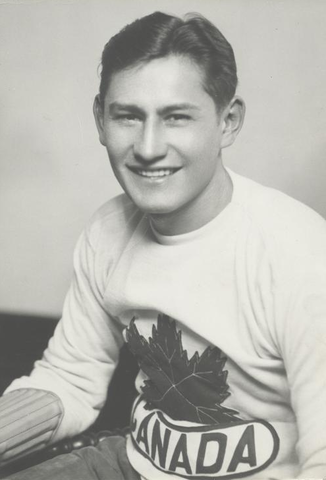IMAGE INFORMATION
EditKenneth Strath "Ken" Moore - Born February 17, 1910 in Balcarres, Saskatchewan – Died December 8, 1981 in Winnipeg, Manitoba was a Canadian Indigenous (Cree) ice Hockey right winger, referee and coach.
- Memorial Cup Champion 1930 with Regina Pats
- Abbott Memorial Cup / Abbott Cup Champion 1930 Regina Pats.
- Allan Cup Champion 1931 with Winnipeg Hockey Club / Winnipeg Winnipegs. 1936 with Kimberley Dynamiters.
- 1932 Winter Olympics Gold Medal Champion 1932 with Team Canada.
- Savage Cup Champion 1935, 1936 with Kimberley Dynamiters.
- Turnbull Memorial Trophy / Turnbull Cup Champion 1944 with St. James Canadians (coach).
Moore is the first Indigenous / First Nations person in Canada to win an Olympic Gold Medal.
One of Canada’s earliest First Nations Olympians, Ken Moore was a member of the Peepeekisis First Nation. He was the 3rd of 8 children, but only 3 of his siblings survived into adulthood. His older brothers died while part of the Canadian Indian residential school system, a tragedy that caused his family to move from Balcarres to Regina, Saskatchewan, where they became one of the early First Nations families to reside in that city.
It was there that he began playing Hockey and, as a family of extremely modest means, Moore’s parents James and Edith sacrificed to provide him with the equipment he needed to participate in sport. All family savings went to purchase skates, jerseys and other equipment. At a young age, Moore demonstrated athletic ability which was matched only by his sportsmanship. One early indication was his receiving the Eilers’ Medal, which was awarded to a player in the Regina Junior Hockey Association who, in the estimation of the fans, was looked upon as “the cleanest athlete” and best display of sportsmanship.
In addition to Hockey, he also played baseball, lacrosse, rugby, basketball and was also a speed skater. At a time when few Canadians, and almost no Aboriginal Canadians, attended university, Moore’s athletic ability enabled him to win scholarships. He attended Campion College and Regina College on athletic scholarships, where he captained Hockey and rugby teams, and was described as “the most versatile athlete in the College.”
Moore was a Canadian National Junior Hockey Champion with the Regina Pats, 1st winning the Abbott Cup as western champions, then he scored the winning goal with 40 seconds left in the 1930 Memorial Cup championship game.
The following season Moore joined the Winnipeg Hockey Club (The Winnipeg Winnipegs) and helped them win the 1931 Allan Cup championship, and was therefore invited to represent Canada at the following year’s Olympic ice Hockey tournament in Lake Placid, New York. He played in 1 game, in the match against Poland, and scored 1 of Canada’s 10 goals in the shutout, helping Canada win the game and the 1932 Olympic Gold Medal at tournament's end.
The Olympics, however, were not the end of Moore’s career. He was a member of the Kimberley Dynamiters in 1936 when they won the Allan Cup. Moore would assist on Hugo Mackie's winning goal in overtime to give the Dynamiters the Allan Cup championship.
Later in his career, Moore coached the St. Boniface Athletics to the Manitoba Amateur Hockey Association junior north division Hockey championship title in 1942 and 1943, and the St. James Canadians to the junior south title and the Manitoba Provincial Junior Hockey Championships in 1944.
In 1976 the Kimberley Dynamiters team Moore played on in the 1930s was inducted into the British Columbia Sports Hall of Fame, and in 1987 the Winnipegs, Moore’s 1932 Olympic Hockey team, was inducted into the Manitoba Sports Hall of Fame and the Manitoba Hockey Hall of Fame, and in 2004, the 1931 Winnipegs Hockey Team was inducted into the Manitoba Sports Hall of Fame.
Kenneth Strath Moore was inducted into the North American Indigenous Athletics Hall of Fame in 2024.
Moore married Edith Mae McDougall and had one daughter, two granddaughters, and one great grandson.





